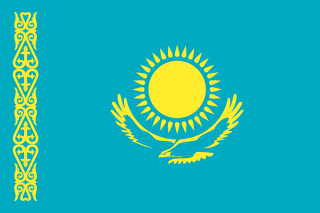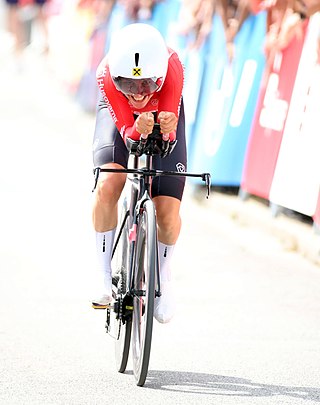
Kazakhstan competed at the 2012 Summer Olympics in London, from 27 July to 12 August 2012. This was the nation's fifth appearance at the Summer Olympics in the post-Soviet era.

Annemiek van Vleuten is a retired Dutch professional road racing cyclist, who most recently rode for UCI Women's WorldTeam Movistar Team.

The women's road race, one of the cycling events at the 2012 Olympic Games in London, took place on 29 July over a course starting and ending on The Mall and heading out of London into Surrey. Nicole Cooke of Great Britain was the defending champion.

Elisa Longo Borghini is an Italian professional road cyclist, who rides for UCI Women's WorldTeam Lidl–Trek.

Anna van der Breggen is a Dutch former professional road bicycle racer, who rode professionally between 2009 and 2021 for Team Flexpoint, Sengers Ladies Cycling Team, Rabo–Liv and SD Worx. She won the gold medal in the women's road race at the 2016 Summer Olympics in Rio de Janeiro, and has won the Giro d'Italia Femminile on four occasions. In 2018 and 2020, she won the women's road race at the UCI Road World Championships.

Katarzyna "Kasia" Niewiadoma is a Polish racing cyclist who rides for UCI Women's WorldTeam Canyon–SRAM. Among her eighteen professional wins are the Tour de France Femmes in 2024, La Flèche Wallonne in 2024, the Amstel Gold Race in 2019, the Trofeo Alfredo Binda-Comune di Cittiglio in 2018, and the Women's Tour in 2017. She twice finished third overall in the Tour de France Femmes, in 2022 and 2023, taking the Queen of the Mountains jersey in 2023. In 2023, she became UCI Gravel World Champion.
The 2015 Philadelphia Cycling Classic, known as The Parx Casino Philly Cycling Classic for sponsorship purposes, was the sixth round of the 2015 UCI Women's Road World Cup. It was held on June 7, 2015, in Philadelphia, Pennsylvania, United States. The event had last appeared in the Women's Road World Cup in 2001, as the Liberty Classic.

Anna Kiesenhofer is an Austrian professional cyclist and mathematician, who rides for UCI Women's WorldTeam Roland Cycling. She is currently a postdoctoral fellow in mathematics at the École Polytechnique Fédérale de Lausanne (EPFL).

Lidl–Trek is a professional cycling team that competes in elite road bicycle racing events such as the UCI Women's World Tour.

The 2021 Tour de France was the 108th edition of the Tour de France, one of cycling's three grand tours. Originally planned for the Danish capital of Copenhagen, the start of the 2021 Tour was transferred to Brest because of the COVID-19 pandemic, with Copenhagen hosting four matches in the UEFA Euro 2020, which had also been rescheduled to 2021 because of the pandemic. Originally scheduled for 2 to 25 July 2021, the Tour was moved to 26 June to 18 July 2021 to avoid the rescheduled 2020 Summer Olympics. This would have been the first occasion on which the Tour de France had visited Denmark. Denmark instead hosted the Grand Départ in 2022.

The men's individual road race event at the 2020 Summer Olympics took place on 24 July 2021 on a course starting at Musashinonomori Park in Tokyo, and ending at the Fuji Speedway in Shizuoka Prefecture. 128 cyclists from 57 nations competed, with 85 completing the course.

The men's road time trial event at the 2020 Summer Olympics took place on 28 July 2021 around the Fuji Speedway in the Shizuoka Prefecture. 39 cyclists from 31 nations competed in the race, with everyone bar one rider eventually finishing.

The women's road time trial event at the 2020 Summer Olympics took place on 28 July 2021 around the Fuji Speedway in Shizuoka Prefecture. 25 cyclists from 20 nations competed in the event.

The Women's road race of the 2020 UCI Road World Championships was a cycling event that took place on 26 September 2020 in Imola, Italy. Annemiek van Vleuten was the defending champion.

The 2022 Tour de France Femmes was the first edition of the Tour de France Femmes, a professional women's cycling race which took place from 24 to 31 July. It was the 16th event in the 2022 UCI Women's World Tour. The Tour consisted of 8 stages, covering a distance of 1,033 kilometres (642 mi).
The 2022 Tour de France Femmes,, was the first edition of the current Tour de France Femmes, one of women's cycling's two grand tours. The race started on 24 July and finished on 31 July 2022, and is the 16th event in the 2022 UCI Women's World Tour.

The 2023 Tour de France Femmes was the second edition of the Tour de France Femmes. The race took place from 23 to 30 July 2023, and was the 21st race in the 2023 UCI Women's World Tour calendar. The race was organised by the Amaury Sport Organisation (ASO), which also organises the men's Tour de France.
The 2023 Tour de France Femmes was the second edition of the Tour de France Femmes. The race took place from 23 to 30 July 2023, and was the 21st race in the 2023 UCI Women's World Tour calendar.

The 2023 Liège–Bastogne–Liège Femmes was a Belgian road cycling one-day race that took place on 23 April 2023. It was the 7th edition of Liège–Bastogne–Liège Femmes and the 14th event of the 2023 UCI Women's World Tour. The race was won for the second time by Dutch rider Demi Vollering of SD Worx, who won the triple crown of the Ardennes classics.

The 2023 Ronde van Vlaanderen was a Belgian road cycling one-day race that took place on 2 April 2023. It was the 20th edition of Tour of Flanders for Women and the 10th event of the 2023 UCI Women's World Tour.















